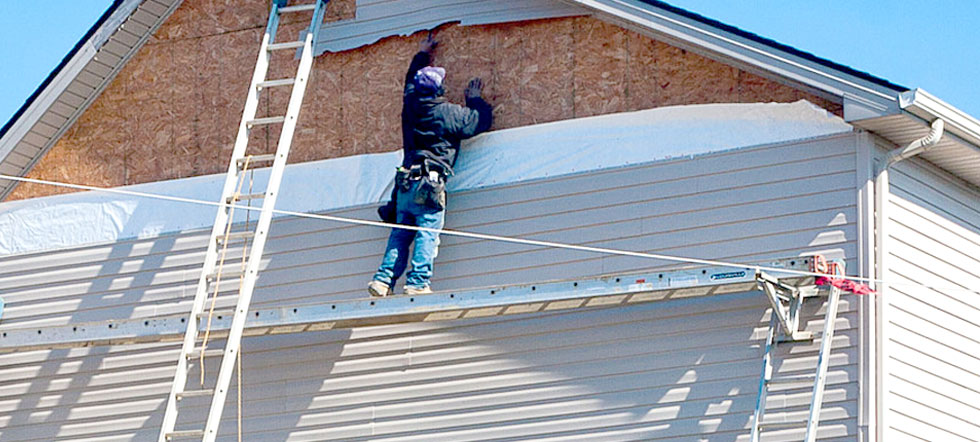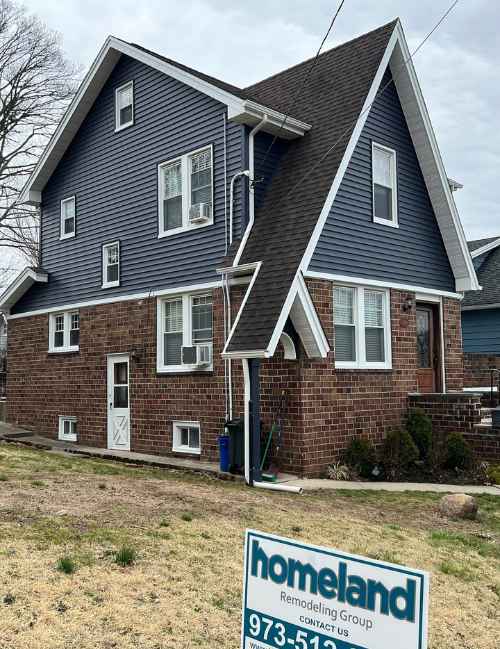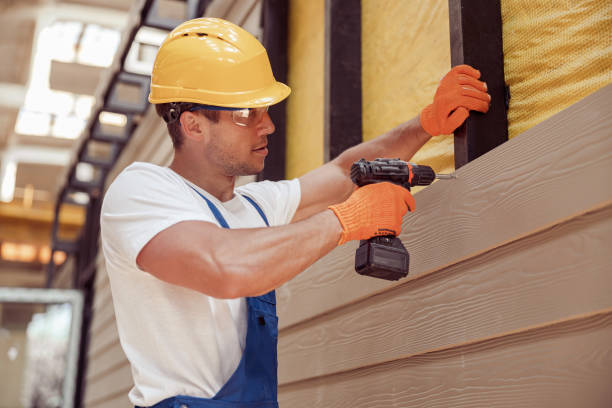Your Go-To Morris Siding Contractor for All Residential Siding Needs
Your Go-To Morris Siding Contractor for All Residential Siding Needs
Blog Article
The Vital Guide to the Various Sorts Of Exterior Siding and Their Distinct Advantages
In the world of home enhancement, picking the appropriate home siding is an essential decision that influences both visual allure and practical performance. The selection of materials available, such as wood, vinyl, fiber block, cement, and steel, each offer unique benefits that deal with different requirements and choices. Understanding these distinctions can significantly improve the durability and value of a residential or commercial property - morris siding contractor. Nevertheless, with a lot of options to take into consideration, which siding material genuinely sticks out for your specific project? Checking out these options can cause informed choices that align with both design and usefulness.
Wood Siding
Wood exterior siding, a popular selection for residential exteriors, uses a classic visual that integrates all-natural beauty with architectural honesty. This exterior siding material is available in different designs, consisting of clapboard, shingles, and board-and-batten, allowing house owners to personalize their façade to match their layout choices. Wood house siding is normally crafted from resilient species such as cedar, redwood, or pine, which are recognized for their strength and ability to hold up against environmental stress factors.
One of the main benefits of timber exterior siding is its outstanding insulation buildings, which can contribute to energy efficiency and lower heating expenses. In addition, wood siding is eco-friendly, making it an eco-friendly option when sourced sustainably. Normal maintenance, consisting of paint or staining, can lengthen its life expectancy and boost its appearance, allowing house owners to preserve the natural appeal of the wood.
Nonetheless, possible drawbacks include susceptibility to bugs, rot, and weather condition damages, necessitating ample treatment and maintenance - morris siding contractor. Despite these problems, when appropriately cared for, timber exterior siding can offer a durable and gorgeous remedy that improves the personality of a home while supplying a cozy, inviting atmosphere

Vinyl Exterior Siding
Plastic siding has arised as a leading selection for property owners looking for a low-maintenance outside choice that integrates resilience and affordability. This flexible product is crafted from polyvinyl chloride (PVC), making it immune to various climate problems, including moisture and UV rays. As an outcome, vinyl house siding does not warp, rot, or fade, making certain resilient aesthetic appeal.
Among the key benefits of plastic siding is its comprehensive range of colors and styles, allowing home owners to attain the desired seek their home without the demand for constant repainting. Additionally, vinyl exterior siding is very easy to set up, which can dramatically decrease labor costs during building and construction or restoration tasks.
Vinyl home siding also adds to power efficiency. Many alternatives feature insulation support, which boosts thermal performance, aiding to preserve comfy indoor temperature levels and potentially lowering energy costs. Furthermore, its smooth surface area helps with simple cleaning, needing just routine washing with a yard tube to get rid of dirt and debris.
Fiber Cement Exterior Siding
Fiber cement exterior siding has actually gained grip among contractors and homeowners alike as a result of its amazing mix of longevity and visual convenience. Composed of a combination of cement, sand, and cellulose fibers, this siding option is crafted to hold up against severe weather, consisting of high winds, hefty rainfall, and temperature variations, making it a lasting option for household exteriors.

Among the primary benefits of fiber cement siding is its resistance to parasites, such as termites, and its non-combustible nature, offering boosted fire safety and security. morris siding contractor. Additionally, it is available in a broad array of appearances, colors, and styles, allowing property owners to achieve their desired aesthetic without compromising performance
An additional advantage is its reduced maintenance needs; fiber cement house siding usually calls for painting or discoloration every 5-10 years, which is less regular than various other products. Its longevity adds to a lower general expense of ownership, as it lowers the demand for regular repair work or substitutes.
Inevitably, fiber cement siding represents a superb financial investment for those seeking a resistant, appealing, and flexible outside alternative, integrating both form and feature to boost the home's visual appeal.
Metal Exterior Siding
The allure of metal siding lies in its durable sturdiness and modern aesthetic charm, making it a favored option for contemporary design. Readily available in products such as light page weight aluminum and steel, steel exterior siding offers a variety of finishes and colors, enabling home owners to accomplish a personalized appearance that enhances their design vision.

Power efficiency is another significant advantage, as lots of steel exterior siding products are designed with insulation alternatives that aid manage indoor temperatures. This can lead to reduced power costs in time. Furthermore, steel exterior siding is usually recyclable, making it an eco-friendly choice for sustainability-minded home owners.
The setup process for metal siding can be relatively straightforward, leading to a quicker turn-around time for building projects. In general, metal siding combines performance and style, making it a sensible option for those looking for a enduring and aesthetically appealing outside coating.
Block and Stone Exterior Siding
Brick and stone exterior siding sticks out as a timeless choice that enhances the aesthetic beauty of any home. Understood for their toughness and reduced upkeep, these materials give an outstanding roi while boosting the residential or commercial property's visual appeal. Readily available in various colors, structures, and patterns, block and rock can be customized to match varied building styles, from typical to contemporary.
Among the key advantages of brick and rock siding is their power performance. Both materials possess all-natural insulating residential properties that aid control interior temperatures, potentially lowering cooling and heating costs. In addition, they offer remarkable fire resistance contrasted to other siding choices, adding to enhanced safety and security.
One more advantage is their durability. Block and stone can last for decades, often requiring very little upkeep past periodic cleaning. Unlike wood house siding, they are unsusceptible insects and rot, guaranteeing a resilient exterior that withstands the elements.
Verdict
In summary, the choice of siding dramatically impacts a home's aesthetic allure, energy effectiveness, and maintenance demands. Each type of house siding-- whether wood, vinyl, fiber metal, brick, or cement and stone-- provides one-of-a-kind benefits customized to numerous property owner choices and environmental conditions.
One of the key benefits of timber exterior siding is its excellent insulation homes, which can contribute to energy performance and reduced home heating costs. Furthermore, timber exterior siding is biodegradable, making it an eco friendly choice when sourced sustainably.One of the primary advantages of metal home siding is its resistance to various straight from the source environmental factors.Energy efficiency next page is an additional substantial advantage, as several steel siding products are made with insulation choices that help control interior temperature levels. Each kind of siding-- whether timber, plastic, fiber brick, steel, or cement and rock-- provides one-of-a-kind benefits tailored to numerous home owner preferences and ecological problems.
Report this page